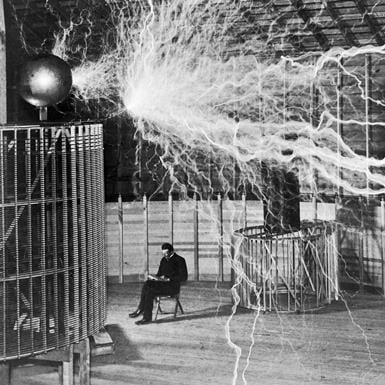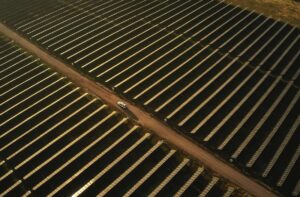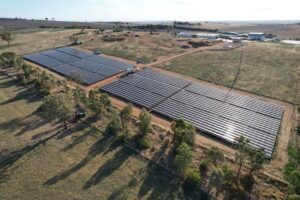 You may not be plugged into this, but disruptive innovation has its own global ideas-fest and it’s on right now.
You may not be plugged into this, but disruptive innovation has its own global ideas-fest and it’s on right now.
This Friday wraps up the three-week long Disruptive Innovation Festival – the hashtag is #thinkDIF – which is based on an alluring thematic question: What if we could reinvent everything?
Reinventing everything certainly includes energy. There’s a growing mob of us in Australia and globally who think we can reinvent electricity, from Old Energy to New Energy, and from a supply-dominated industry-centric model to consumers-in-control.
The apex of such technology-led optimism, internationally, is thought-leaders like Stanford University’s Tony Seba, the author of ‘Clean Disruption of Energy and Transportation’, who forecasts that fossil fuels will be swept aside in less than two decades by data-enabled solar PV, energy storage systems, and autonomous electric vehicles.
It’s the recipe for a Goldilocks energy future, perhaps as early as the 2030s for Australia, where we find ourselves with ridiculously abundant and inexpensive clean energy. There’s just an often painful, highly challenging 15-20 years to get there.
This is exactly the kind of disruptive thinking that led a small team in Australia to conceive ‘The Tech Nerd’s User-Friendly Guide to Reinventing Electricity for Consumers’, a special edition of RenewEconomy’s Energy Insiders podcast series, which goes live on the #thinkDIF platform tonight (Thursday, November 23).
In a toxic Australian political environment, with two decades of depressing policy failure on energy reform and climate change action, it can be a relief to indulge in a bit of rampant techno-optimism on the clean energy future front.
The alternative is bleak. We can get so dragged down by outdated, lowest common denominator policy debates like the National Electricity Guarantee – the negatively tagged NEG – that we sometimes find it hard to celebrate our world-class successes.
That’s the starting point for the Tech Nerd’s guide podcast. The global organisers of #thinkDIF – the team at the Ellen MacArthur Foundation, who also provide international leadership on the rise of the ‘Circular Economy’ – embraced our pitch that technology is putting hope on the energy horizon in Australia.
The upbeat, international-facing part of the pitch goes like this: ‘In Australia, once a global bastion of coal, over 20% of homes now have solar panels on their roofs, which is by far the highest national penetration in the world. Widespread adoption of batteries may be just around the corner, where our homes become the power station, and where data is power for consumers. The age of the energy nerd is here!’
Here on the ground in Australia we know that the ever-powerful coal lobby’s rearguard defensive action is far from exhausted – witness the Adani mine battle and the economically crazy notions of building new coal-fired power stations – but we also can sense the inevitability of distributed cleaner energy taking over.
Those of us who are embracing the techno-optimist mode as a tonic for deep policy frustration need to make our case if we are going to swell our ranks and bring greater positive disruptive innovation to bear on the energy industry.
The Tech Nerd’s guide podcast canvasses a hopefully near future where the same sort of user-friendly consumer tech that we increasingly embrace in many aspects of our daily lives – telecommunications, media, finance and personal health – is finally delivered for energy as well.
A world where Siri, Apple’s online assistant, is keeping tabs on electricity use for us, coordinating useful stuff like running our swimming pool pumps or our air-conditioning when our rooftop solar panels are generating electricity, but smart enough to make sure that the pool goes off if another power-hungry appliance like a clothes dryer comes on.
Less optimistically, we also know that electricity consumers are spectacularly ill-prepared for this technology-enabled shift because they have been held captive for too long in a system that makes a power bill more like grudge-paying a tax than making a satisfying purchase.
The Chief Tech Nerd in the podcast line-up, Wattwatchers CEO Gavin Dietz, is a passionate home technologist who likens the current consumer relationship to energy as a form of mass Stockholm syndrome.
A dysfunctional space where the paying customers are so brainwashed by the energy industry legacy that they don’t know how to escape – even when the technology and data keys to their prison of the mind are dangling in front of them.
The podcast host is Giles Parkinson, the RenewEconomy Founder and Editor, who’s disruptively innovated business media with his progressive take on a cleaner, smarter energy economy.
The other speakers are Natalie Isaacs, the Founder and CEO of the women’s mass movement for practical action on climate change, 1 Million Women, who is the Australian Geographic Society’s 2017 Conservationist of the Year; and young smart-energy entrepreneur Darius Salgo, Co-Founder and CEO of local energy trading startup Nexergy, based at EnergyLab in Sydney.
(For full author’s disclosure, Dietz is my boss, Isaacs is my wife, Salgo also is a part-time colleague at Wattwatchers, and the regular weekly Energy Insiders series is co-sponsored by Wattwatchers.)
Variants on the phrase ‘techno optimism’ have been used frequently in this article. The repetition is deliberate. There’s always a risk of reckless or blind optimism, and there are sound reasons to be sceptical about technology as a magic fix.
Exhibit A in the energy arena is so-called ‘smart meters’, which have never delivered on early claims that they would revolutionise electricity for consumers, and perhaps as a result more than half of Australian homes still have old-style non-digital meters.
The clear counterpoint to optimism, however, is pessimism and wallowing in the miserable consequences of failing to achieve real change through a conga line of ill-fated policy and market mechanisms.
Technology is just cause for optimism because it works, with rooftop solar proliferation the star achiever of Australia’s last decade, and more to come as renewables get smarter and inevitably storm through 50 percent-plus of Australian generation by 2030 (whatever today’s NEG advocates may think).
Data is the next big element that boosts all clean energy plays, including energy efficiency and demand management, and then we are on into artificial intelligence and machine learning. It’s a Tech Nerd’s paradise, out of which can grow consumer tech for energy that finally empowers the people who pay the power bills.
*Murray Hogarth manages communications and community networks for energy technology company Wattwatchers, which conceived and sponsored The Tech Nerd’s User-Friendly Guide to Reinventing Electricity for Consumers.
The DIF session is hosted here: https://www.thinkdif.co/sessions/the-tech-nerds-user-friendly-guide-to-reinventing-electricity-for-consumers








